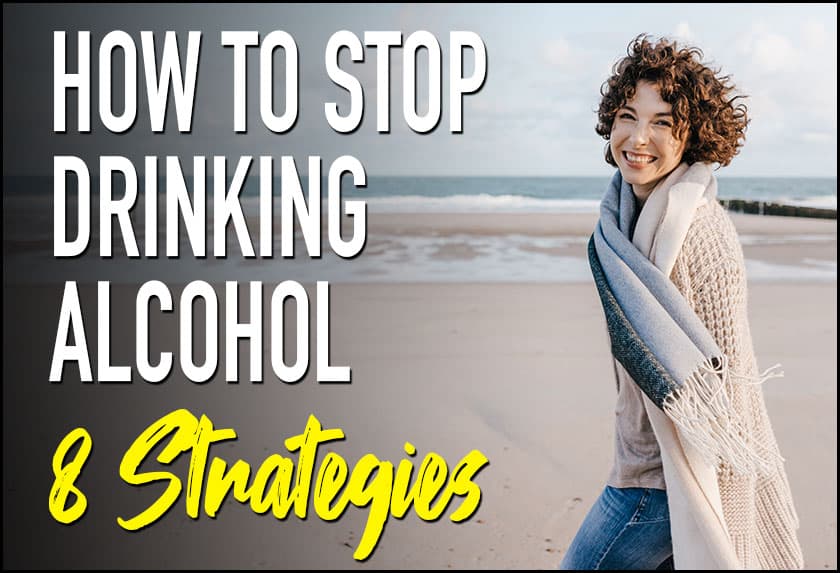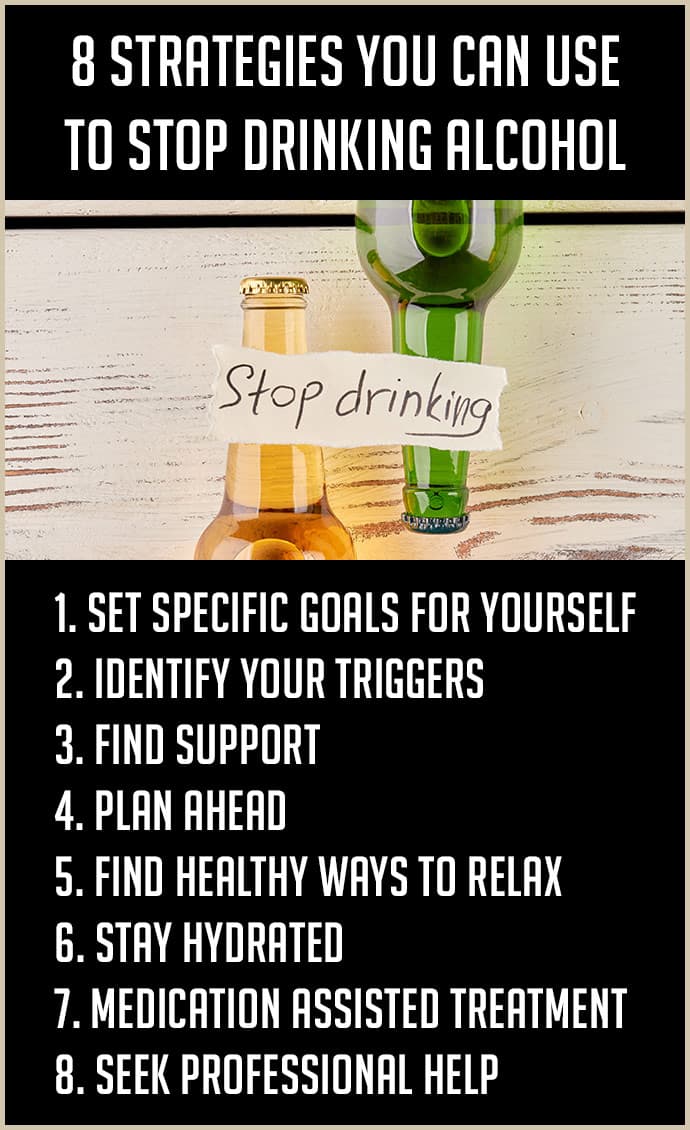It is a significant and often difficult decision to stop drinking alcohol, but it can have numerous benefits for your physical and mental health, relationships, and overall quality of life. If you’re struggling with an alcohol addiction and want to quit or simply cut back on your drinking, there are a few strategies you can try to help you get there.
Here are 8 Strategies on How To Stop Drinking Alcohol
-
Set specific goals for yourself.
Set specific, attainable goals for yourself before attempting to reduce or eliminate your alcohol consumption. This could mean limiting the number of drinks you have per week or month, or committing to not drinking at all.
-
Identify your triggers.
Consider what causes you to drink alcohol. Is it stress, boredom, social situations, or another factor? Once you’ve identified your triggers, you can work on developing alternative coping strategies for dealing with these situations.
-
Find support.
As you work to reduce your alcohol consumption, having the support of friends, family, or a professional therapist or counselor can be beneficial. You might also want to think about joining a support group, such as Alcoholics Anonymous, which can give you a sense of community and accountability as you work on your goals.
-
Plan ahead.
If you know you’ll be in an environment with alcohol, plan ahead and think about how you’ll handle it. This could mean bringing a non-alcoholic drink, finding a designated driver, or simply leaving the situation if you don’t feel comfortable.
-
Find healthy ways to relax and cope with stress.
Because alcohol is frequently used to relax or cope with stress, it is critical to find healthier ways to manage these emotions. This could include exercising, meditating, talking to a friend or therapist, or discovering a new hobby.
-
Stay hydrated.
Because drinking alcohol can cause dehydration, it’s critical to stay hydrated by drinking plenty of water. This can make you feel more alert and energized, as well as help you avoid hangovers.
-
Consider using medication.
There are several medications available to help reduce alcohol cravings and make it easier to stop drinking. Among these are naltrexone, acamprosate, and disulfiram. Before beginning any medication, consult with a healthcare professional to determine what is best for you.
-
Seek professional help.
If you have an alcohol addiction and are having difficulty reducing your intake on your own, it may be beneficial to seek professional assistance. Therapy, medication, or a combination of the two may be used.
It can be difficult to reduce or eliminate your alcohol consumption, but it can also be extremely rewarding. You can work toward a healthier, sober lifestyle by setting specific goals, finding support, and seeking professional help as needed.
Cutting Back on Alcohol or Quitting Altogether
Cutting back on alcohol and quitting completely are two different ways to reduce your alcohol consumption. The following are the results of a survey of people’s attitudes toward the use of social media.
Cutting back on alcohol involves reducing the amount of alcohol you drink, but not necessarily quitting altogether. This approach can be beneficial for people who do not feel ready or able to completely abstain from alcohol, or for those who only drink occasionally and want to reduce the frequency or amount they drink.
To successfully reduce your alcohol consumption, set specific and attainable goals for yourself, such as limiting the number of drinks you consume per week or month. Identifying your triggers and developing alternative coping mechanisms can also be beneficial, as can seeking support from friends, family, or a professional therapist or counselor.
Abstinence, or quitting alcohol completely, entails completely eliminating alcohol from your diet. This approach is frequently recommended for people who have developed an alcohol addiction or are suffering from the consequences of their drinking.
Quitting alcohol can be a difficult process, so having a plan in place to help you stay sober is essential. Finding support from friends and family, joining a support group such as Alcoholics Anonymous, and seeking professional help from a therapist or counselor are all options.
In some cases, medication may be prescribed to help reduce cravings and make quitting alcohol easier. Before beginning any medication, consult with a healthcare professional to determine what is best for you.
Finally, the approach that is best for you will be determined by your unique circumstances and goals. If you’re not sure which approach is best for you, consult with a healthcare professional, such as a licensed therapist or doctor.
Getting Help With Alcohol Addiction
Alcohol addiction treatment, also known as alcoholism, can take many forms and may include a variety of approaches. Among the most common treatment options are:
1) Cognitive behavioral therapy (CBT) and other types of therapy can assist individuals in understanding and changing the thought patterns and behaviors that contribute to their addiction. Therapy can be done individually or in a group setting, and it can be done in person or via teletherapy.
2) Support groups, such as Alcoholics Anonymous, provide a sense of community and accountability for people battling an alcohol addiction. These groups frequently adhere to a structured program and may include group discussions as well as individual support.
3) Several medications are available to help reduce alcohol cravings and make it easier to stop drinking. Among these are naltrexone, acamprosate, and disulfiram. Before beginning any medication, consult with a healthcare professional to determine what is best for you.
4) Inpatient treatment programs, also known as rehab, entail spending time in a treatment facility while receiving intensive therapy and support. Individuals with severe alcohol addiction or those who have struggled to overcome their addiction on their own may benefit from these programs.
5) Outpatient treatment programs require individuals to attend therapy sessions or support groups on a regular basis while still allowing them to live at home and participate in their normal daily activities. Individuals with less severe addictions or those who have already completed an inpatient treatment program may benefit from these programs.
It is critical to note that no single treatment approach is appropriate for everyone, and the most effective treatment plan will be determined by the individual’s needs and circumstances. Working with a healthcare professional or licensed therapist to determine the best treatment plan for you is a good idea if you want to learn how to stop drinking alcohol.














